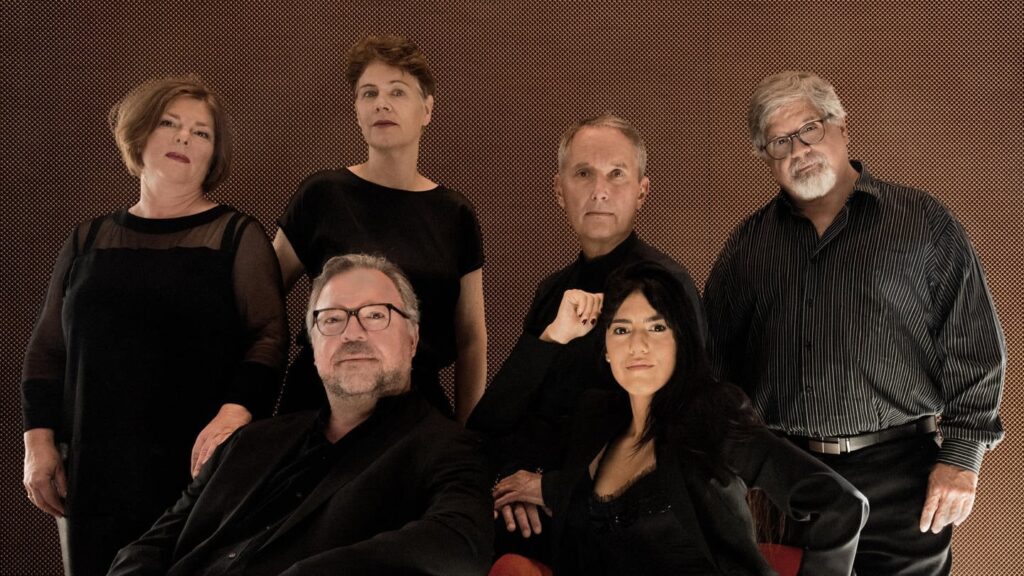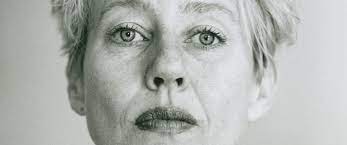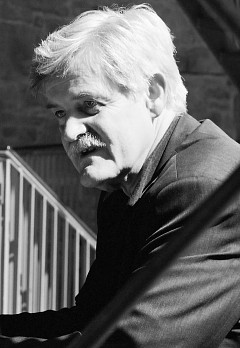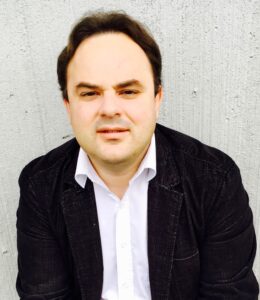Voices is a series of commissions asking composers to address the subject of Neurological Disorder, Parkinson’s Disease and mental health issues through the human voice. This collaboration involves the Neue Vocalsolisten in Stuttgart, one of the preeminent vocal ensembles dedicated to contemporary music. As a starting point, three composers were asked to create works. Evis Sammoutis, a composer with direct and personal experience of these disorders , Nikolaus Brass, who is also a practicing physician and Iris ter Schiphorst. No particular restrictions were given to how the composers dealt and created material apart from giving them the overall project description.
These three pieces were premiered at the Donaueschingen Festival in October 2022.
About Neue Vocalsolisten:

The seven singers are constantly searching for new forms of vocal expression in exchange with composers. One focus is the work with artists who virtuously exploit the possibilities of digital media, with interest in networking, in playing with genres, in dissolving space, perspectives and functions. Interdisciplinary formats between music theater, performance, installation and concert staging characterise up to 30 premieres a year. Together with programmers and web designers, the Neue Vocalsolisten explore “magic spaces” – performance formats between analogue and digital perception. At the centre of the ensemble’s work is vocal chamber music theater: hundreds of works have been composed “tailor-made” for the singers.
The Neue Vocalsolisten have been honoured with numerous awards for their contributions to contemporary vocal music, including the Silver Lion of the Venice Biennale 2021 and the Italian critics’ prize Premio Abbiati 2022. In master classes and a digital “NVS Academy”, the Neue Vocalsolisten introduce young artists to the challenges of experimental vocal music.
About the composers:

As a composer, Iris ter Schiphorst is influenced by years of experience as a classical pianist, a bass player, percussionist, keyboard player and sound engineer in various rock and pop bands. She studied theatre and culture studies and philosophy in Berlin and attended classes with Dieter Schnebel, Luigi Nono and Helga de la Motte. Concurrently, she worked intensively with electronical music and sample techniques (1992 first prize in the third composition competition for synthesizer and computer music). In the late 80’s, she became a co-founder of the association ‘zeit-Musik’ together with several composers and musicologists. Her compositions from that period centre mainly around the relation between manuscript and sound.Iris ter Schiphorst’s works have been performed at numerous festivals including those in Donaueschingen, Witten, Helsinki, Stockholm, Amsterdam, Porto, Paris (Festival d’automne), Munich (musica viva), Bielefeld (visible music), and many others. Since 2013, Iris is a member of the Berlin Academy of Arts .

Nikolaus Brass, born in Lindau in 1949, initially studied medicine and took private composition lessons with Peter Kiesewetter at the Munich Academy of Music. He concluded his medical studies at the Free University of Berlin. He studied composition with Frank Michael Beyer and later privately with Helmut Lachenmann. After being invited to the Gaudeamus Muziekweek in the Netherlands, he began publishing his compositions in 1981. Since then he has had numerous premieres at the most important New Music festivals, such as the Donaueschingen Festival, musica viva Munich, Ultraschall Berlin, ECLAT Stuttgart, Klangspuren Schwaz or Witten Days for New Chamber Music. Alongside orchestral works such as Der Garten for four male voices and orchestra (premiered in 2012 by Peter Eötvös at musica viva), vocal music such as fallacies of hope – deutsches requiem, with text projections from the novel Die Ästhetik des Widerstands by Peter Weiss, for 32 voices (premiered in 2014 by the SWR Vokalensemble, conducted by Florian Helgath, at the ECLAT Festival) and chamber music are the main emphases of his work. In recent times, Brass has turned more towards staged projects (the chamber music theatre work Sommertag, based on the drama of the same name of Jon Fosse, was premiered in 2014 at the Munich Biennale). In addition, he has also authored radio programmes and journal articles.

Evis Sammoutis was born in Cyprus in 1979. By the age of sixteen, he had already obtained both the LRSM and his performance and teaching diploma with distinction. In 1998 he moved to England to study at university. 2006 PhD in musical composition at the University of York with Dr Thomas Simaku. Further studies at world-renowned festivals, seminars and workshops, including Darmstadt, IRCAM, Royaumont and Tanglewood as a composition fellow working with such composers as Brian Ferneyhough, Georges Aperghis, George Benjamin, Johannes Schollhorn and Augusta Read Thomas. As a composer he is acutely interested in the relationship between timbre and harmony and developing instrumental characteristics into musical substance, frequently using unorthodox playing methods to create unusual musical landscapes. A precise chronotopological positioning of every gesture, aided by technology characterises many of his highly virtuoso works.
The piece from Iris ter Schiphorst was also inspired by the work of May Kooreman, architect and artist. May draws, paints and writes about the invisible aspects of neurological change from within based on personal experiences with Parkinson disease. Her work describes a process of inner curiosity and growth in color, line, text and music. Based on this work the foundation cooperated with fantastic musicians and composers. For both May and the foundation this process has led to other inspiring paths. Her work can be found at www.Mayswings.com.